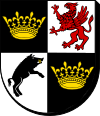Schweidnitz
| Świdnica | ||
|---|---|---|

Old town
|
||
|
||
| Coordinates: 50°51′N 16°29′E / 50.850°N 16.483°ECoordinates: 50°51′N 16°29′E / 50.850°N 16.483°E | ||
| Country |
|
|
| Voivodeship | Lower Silesian | |
| County | Świdnica County | |
| Gmina | Świdnica (urban gmina) | |
| City rights | 1267 | |
| Government | ||
| • President | Beata Moskal-Słaniewska (SLD) | |
| Area | ||
| • Total | 21.76 km2 (8.40 sq mi) | |
| Elevation | 250 m (820 ft) | |
| Population (2014) | ||
| • Total | 59,002 | |
| • Density | 2,700/km2 (7,000/sq mi) | |
| Time zone | CET (UTC+1) | |
| • Summer (DST) | CEST (UTC+2) | |
| Postal code | 58-100 to 58-106 | |
| Area code(s) | +48 74 | |
| Car plates | DSW | |
| Website | http://www.um.swidnica.pl | |
Świdnica (Polish pronunciation: ['ɕfʲidʲˈɲit͡sa]; German: Schweidnitz; Czech: Svídnice) is a city in southwestern Poland in the region of Silesia. It has a population of 59,002 inhabitants according to 2014 figures. It lies in Lower Silesian Voivodeship, being the seventh largest town in that voivodeship. From 1975–98 it was in the former Wałbrzych Voivodeship. It is now the seat of Świdnica County, and also of the smaller district of Gmina Świdnica (although it is not part of the territory of the latter, as the town forms a separate urban gmina). Świdnica became part of the Wałbrzych agglomeration on 23 January 2014.
Świdnica/Schweidnitz became a town in 1250, although no founding document has survived that would confirm this fact. In the beginning, the town belonged to the Duchy of Breslau (now Wrocław). By 1290, the town had city walls and six gates, crafts and trade were blossoming, and in 1291-1392 it was the capital of the Duchy of Schweidnitz.
At the end of the 14th century the city was under rule of the Kingdom of Bohemia, and a long period of growth began. The last Polish Piast duke was Bolko II of Świdnica, and after his death in 1368 the duchy was held by his wife until 1392; after her death it was incorporated into Bohemia by Wenceslaus IV, king of Bohemia and later Holy Roman Emperor. In 1493, the town is recorded by Hartmann Schedel in his Nuremberg Chronicle as Schwednitz
...
Wikipedia


